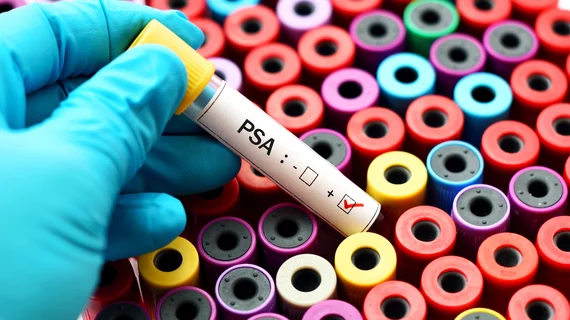Pre-treatment PET/CT helps doctors select best candidates for prostate cancer therapy
A 68Ga-PSMA-PET/CT scan can predict how much radioligand therapy at-risk organs may absorb in patients with prostate cancer, potentially helping doctors better choose candidates for treatment.
Selecting individuals eligible for 177Lu-PSMA therapy is challenging and current approaches only work for 40%-60% of patients. But pre-treatment 68Ga-PSMA-PET/CT proved capable of more accurately assessing participants’ possible response, experts explained Oct. 8 in the European Journal of Nuclear Medicine and Molecular Imaging.
The approach may offer doctors crucial information regarding who may be eligible for cancer therapy and how much to administer.
“Our study showed that an absorbed dose prediction based on a single time point 68Ga-PSMA-PET scan is feasible, similar to what earlier studies found for 124I-PET/CT dose prediction of 131I-therapy in thyroid cancer patients,” Steffie M. B. Peters, with Radbound University Medical Center’s Department of Medical Imaging, and co-authors wrote. “Therefore, an absorbed dose prediction based on the pre-therapeutic 68Ga-PSMA-PET scan would provide the physician with a useful tool to manage or refrain from additional treatment cycles when there is a significant risk of organ toxicity.”
The Dutch team enrolled 10 patients with low-volume hormone-sensitive cancer to receive 68Ga-PSMA-11 PET/CT prior to undergoing 177Lu-PSMA-617 therapy. SPECT/CT was performed at various hour intervals during therapy and absorbed organ dose predictions were based partly on imaging tracer uptake one hour after injection.
Looking at absorbed dosage ratios for patients’ kidneys, liver, submandibular and parotid glands, the authors determined the molecular imaging approach to be effective.
“A single time point 68Ga-PSMA-PET scan can be used to predict the absorbed dose of 177Lu-PSMA therapy to organs, and (to a limited extent) to lesions,” Peters and colleagues noted. “This strategy facilitates in treatment management and could increase the personalization of 177Lu-PSMA therapy.”
Read the full study here.

